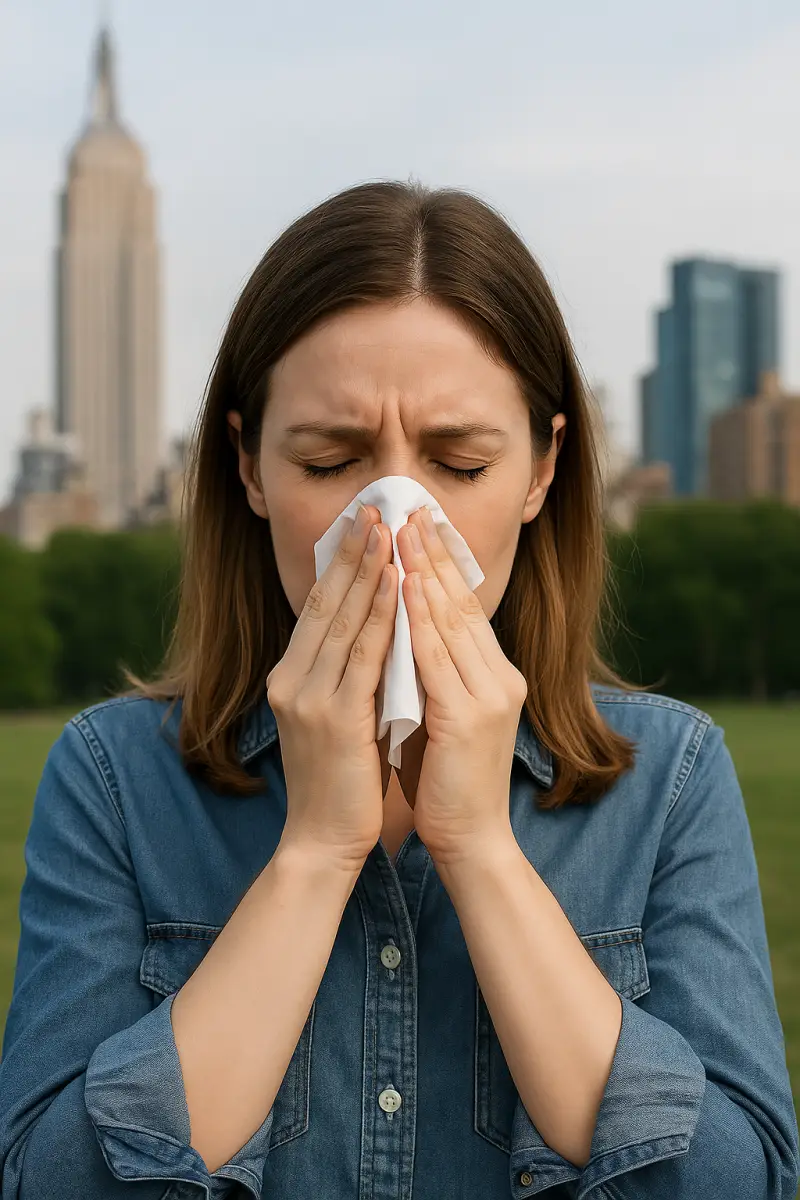Struggling with itchy eyes and a runny nose in New York City? Here’s a practical guide to surviving hay fever NYC—from timing and triggers to food, supplements, and day-to-day coping.
🌤 NYC Weather, AQI & Google Pollen Forecast
Temperature: -1.22°C
Condition: Clear sky
AQI: 53 (Moderate)
✅ Air quality is acceptable today. If you have hay fever, avoid peak morning pollen hours (6–10am), rinse with saline, and keep windows closed.
What Is Hay Fever?
Hay fever (allergic rhinitis) is an immune reaction to airborne allergens like tree, grass, and weed pollen. Your nose and eyes produce mucus to protect against a perceived threat—your immune system is simply being over-protective.
When Is Hay Fever Over NYC?
NYC typically sees several pollen “waves”:
- Tree pollen: mainly spring (often March–May).
- Grass pollen: late spring to early summer (often May–June).
- Weed & ragweed: late summer into fall (often late August–September, sometimes into October).
The season usually winds down after the first hard frost in late fall. If you’re asking “when is hay fever over NYC”, the practical answer is: symptoms often ease substantially by late October–November, but this varies year to year and by your personal triggers.
Is Hay Fever Contagious?
No. Hay fever is an allergic response, not an infection. You can’t “catch” it from someone else. (It’s still smart to carry tissues and wash your hands frequently, especially during cold/flu season.)
Common Symptoms in NYC
- Itchy, watery, or puffy eyes
- Runny or stuffy nose, sneezing fits
- Scratchy throat or post-nasal drip
- Facial pressure, fatigue, brain fog
NYC Triggers & Lifestyle Factors
Beyond pollen counts, other inhaled irritants can “stack” and worsen symptoms—think subway dust, street smoke, and BBQ/food-truck smoke in summer. Reducing overall irritant exposure helps calm that hyper-vigilant response.
Diet, Gut Health & Supplements
Naturopathic insight: Removing dietary irritants may reduce stress on the immune system and soothe mucous membranes.
- Elimination approach: Some people find wheat and dairy aggravating to the gut mucosa, which can echo as nasal/eye irritation. Everyone is different—identify and pause your personal irritants for a few weeks and reassess. Consider a consultation with a Naturopathic Nutritionist for a tailored plan.
- Probiotics (acidophilus & bifidus): May modulate inflammatory signaling in the gut and help dial down immune reactivity.
- Rutin + Quercetin + Vitamin C: Often used to support healthy histamine regulation and inflammatory balance.
- Herbals & homeopathy: Can be helpful when matched to the individual; personalized guidance improves results.
Note: Supplements aren’t a substitute for medical care. If you have asthma, severe symptoms, or need medication guidance, speak with an allergist or your primary care provider.
Do Smoked Meats Worsen Hay Fever?
They can for some people. There are two angles:
- Smoke exposure: Inhaled smoke (from grills or BBQ) is an airway irritant and may intensify nasal/eye symptoms.
- Food factors: Processed and smoked meats can be higher in histamine and additives, which some individuals find symptom-provoking during peak allergy times.
If you notice flares after summer BBQs, try minimizing smoke exposure and swap in fresh, minimally processed proteins to see if symptoms improve. This addresses the concern: do smoked meats worsen hay fever—sometimes, yes, particularly in sensitive individuals.
Quick Relief Checklist
- Monitor NYC pollen counts; mask up on high-count days.
- Rinse with saline after outdoor exposure; shower before bed.
- Trial diet irritant removal; consider probiotics, quercetin, rutin, and vitamin C.
- Minimize smoke/smog exposure; be mindful with smoked meats during peak season.
- Consult an allergist for prescription options or immunotherapy if symptoms persist.
FAQs
When is hay fever over NYC?
Typically by late fall after the first hard frost. Tree pollen dominates spring, grass early summer, and ragweed late summer to early fall, with symptom relief often coming by late October–November.
Is hay fever contagious?
No. It’s an allergic response, not an infection—so is hay fever contagious? No.
Do smoked meats worsen hay fever?
They can. Airborne smoke irritates airways, and smoked/processed meats can be higher in histamine and additives that some people find aggravating.


Hay Fever Social Impairment: Coping in NYC
Allergies can affect commuting, productivity, and social plans—what researchers call hay fever social impairment. To reduce the impact: